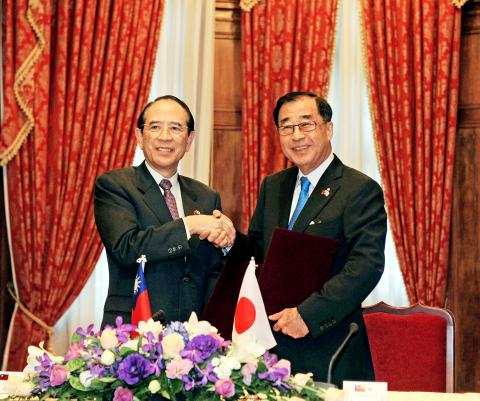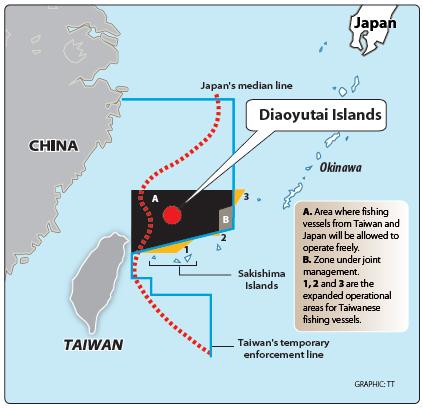Taiwan and Japan yesterday inked a fisheries agreement in a bid to end controversies over fishing in waters surrounding the contested Diaoyutai Islands (釣魚台). The agreement includes an escape clause which Taipei said allows both sides to set aside disputes over their competing sovereignty claims.
The agreement assured Taiwanese vessels an intervention-free fishing zone in waters between 27° north latitude and the Sakishima Islands, Okinawa Prefecture, and gave Taiwan an additional fishing zone of 1,400 square nautical miles (4,800km2) outside Taiwan’s temporary enforcement line, government officials said.
Under the deal, fishing vessels from both countries can operate in a large area within the designated zone without being subject to the jurisdiction of the other side, while a smaller area of the zone, where Japanese fishing vessels frequently operate, is under joint management by the two governments.

Photo: CNA
Provisions under the agreement do not apply to waters within 12 nautical miles — a state’s territorial waters — surrounding the Diaoyutai Islands, because the islands are claimed by both Taiwan and Japan, which calls them the Senkaku Islands.
China also claims sovereignty over the Diaoyutais. Japan and China signed a fisheries agreement in 1997, which took effect in 2000, under which both sides co-manage waters above 27° north latitude.
At the signing ceremony at the Taipei Guest House, Association of East Asian Relations Chairman Liao Liou-yi (廖了以) and Interchange Association, Japan Chairman Mitsuo Ohashi hailed the agreement, which they said marked a big step forward in bilateral relations.

The negotiations yesterday were the 17th round since talks started in August 1996.
Taipei and Tokyo initiated fishery talks following incidents of Taiwanese fishing boats being seized, detained or expelled by the Japan Coast Guard after Tokyo ratified the UN Law of the Sea Treaty in 1996 and set up a 200 nautical mile exclusive economic zone that included waters surrounding the Diaoyutais.
Ohashi said it was “with great pleasure” that the deal was finally signed.
The primary goals were to “maintain peace and stability in East China Sea” and to “strengthen the existing friendly relations with Taiwan,” he said.
At a press conference after the signing ceremony, Minister of Foreign Affairs David Lin (林永樂) said that the agreement did not address the competing claims over the Diaoyutais, as both governments agreed to “set aside the dispute.”
As stated in Article 4, provisions that both sides have agreed to under the deal have no effect on each side’s sovereignty claims over the Diaoyutais, Lin said, adding that the escape clause was written into the agreement at Taipei’s insistence.
"We did not back down one bit over the sovereignty issue in the talks,” Lin said.
Waters within 12 nautical miles surrounding the Diaoyutais were exempted from the agreement because “we insisted that the area is our territorial sea, while Japan upheld its position” that it is theirs, Lin said.
Coast Guard Administration Minister Wang Jinn-wang (王進旺) called on Japanese and Chinese fishing vessels not to operate in waters within the 12 nautical miles surrounding the Diaoyutais and vowed to adopt appropriate measures against Chinese and Japanese fishing vessels to protect the rights of Taiwanese fishermen.
Under the agreement, Taiwan and Japan also agreed to establish a fisheries commission to discuss other issues, including the delineation of overlapping waters in their respective exclusive economic zones above 27º north latitude and waters south of Sakishima Islands, on an annual basis.
Meanwhile, China yesterday expressed concern about the new agreement.
“We are extremely concerned about Japan and Taiwan discussing and signing a fishing agreement,” Chinese Ministry of Foreign Affairs spokesman Hong Lei (洪磊) told a daily news briefing.
“We hope that Japan earnestly abide by its promises on the Taiwan issue and act cautiously and appropriately,” she said.
Additional reporting by Reuters
History of negotiations
‧ First two rounds of negotiations, 1996: Both sides insisted on their respective sovereign claims over the Diaoyutai Islands and did not have substantial discussions about fisheries issues.
‧ Third round of negotiations, 1997: Working-level discussions began about fishing grounds, but delimitation was not discussed.
‧ Fourth, fifth and sixth rounds of negotiations, 1998 to 2000: Taiwan proposed that a commission be set up to co-manage fisheries in the area and that fishing grounds be delimited based on “equitable principle.” Japan rejected the proposals.
‧ Seventh to 15th rounds of negotiations, 2000 to 2005: Taiwan demanded co-management of waters below 27o north latitude and that Taiwanese fishermen have the rights to fish in waters between 27o north latitude to 29o18’ north latitude, because this is within Taiwan’s Exclusive Economic Zone. Japan rejected the proposal and wanted to negotiate based on the principle of a “geographic median line.” It also rejected Taiwan’s claim to fish in waters above 27o north latitude because the area was marked as a zone of joint control between China and Japan in their bilateral fisheries agreement signed in 1997.
‧ Sixteenth round of negotiations, 2009: Consensus was reached on four general principles to deal with disputes on fisheries issues. No substantial discussions on delimitation were held.
Prepared by staff reporter Shih Hsiu-chuan

Intelligence agents have recorded 510,000 instances of “controversial information” being spread online by the Chinese Communist Party (CCP) so far this year, the National Security Bureau (NSB) said in a report yesterday, as it warned of artificial intelligence (AI) being employed to generate destabilizing misinformation. The bureau submitted a written report to the Legislative Yuan in preparation for National Security Bureau Director-General Tsai Ming-yen’s (蔡明彥) appearance before the Foreign Affairs and National Defense Committee today. The CCP has been using cognitive warfare to divide Taiwanese society by commenting on controversial issues such as Taiwan Semiconductor Manufacturing Co’s (TSMC, 台積電) investments in the

HELPING HAND: The steering committee of the National Stabilization Fund is expected to hold a meeting to discuss how and when to utilize the fund to help buffer the sell-off The TAIEX plunged 2,065.87 points, or 9.7 percent, to close at 19,232.35 yesterday, the highest single-day percentage loss on record, as investors braced for US President Donald Trump’s tariffs after an extended holiday weekend. Amid the pessimistic atmosphere, 945 listed companies led by large-cap stocks — including Taiwan Semiconductor Manufacturing Co (TSMC, 台積電), Hon Hai Precision Industry Co (鴻海精密) and Largan Precision Co (大立光) — fell by the daily maximum of 10 percent at the close, Taiwan Stock Exchange data showed. The number of listed companies ending limit-down set a new record, the exchange said. The TAIEX plunged by daily maxiumu in just

INVESTIGATION: The case is the latest instance of a DPP figure being implicated in an espionage network accused of allegedly leaking information to Chinese intelligence Democratic Progressive Party (DPP) member Ho Jen-chieh (何仁傑) was detained and held incommunicado yesterday on suspicion of spying for China during his tenure as assistant to then-minister of foreign affairs Joseph Wu (吳釗燮). The Taipei District Prosecutors’ Office said Ho was implicated during its investigation into alleged spying activities by former Presidential Office consultant Wu Shang-yu (吳尚雨). Prosecutors said there is reason to believe Ho breached the National Security Act (國家安全法) by leaking classified Ministry of Foreign Affairs information to Chinese intelligence. Following interrogation, prosecutors petitioned the Taipei District Court to detain Ho, citing concerns over potential collusion or tampering of evidence. The

‘COMPREHENSIVE PLAN’: Lin Chia-lung said that the government was ready to talk about a variety of issues, including investment in and purchases from the US The National Stabilization Fund (NSF) yesterday announced that it would step in to staunch stock market losses for the ninth time in the nation’s history. An NSF board meeting, originally scheduled for Monday next week, was moved to yesterday after stocks plummeted in the wake of US President Donald Trump’s announcement of 32 percent tariffs on Taiwan on Wednesday last week. Board members voted to support the stock market with the NT$500 billion (US$15.15 billion) fund, with injections of funds to begin as soon as today. The NSF in 2000 injected NT$120 billion to stabilize stocks, the most ever. The lowest amount it